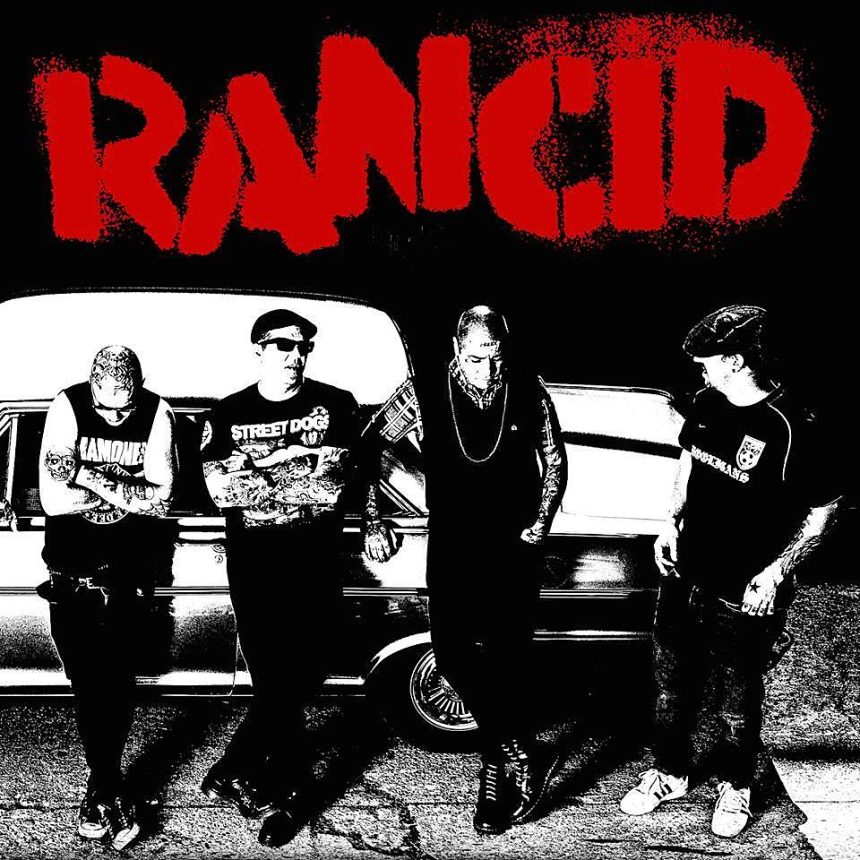This article was originally published in 2019. It was updated in 2023 to include Rancid’s new album ‘Tomorrow Never Comes.’ Various Rancid records and merch available now in our store.
We’re hitting the point in punk history where the bands who experienced mainstream success during the “punk revival” of the ’90s are starting to be considered as important, influential, and legendary as the classic bands that those bands were influenced by, and one of the most significant bands from that period is Rancid. As far as the divide between “punk” and “pop punk” goes, Rancid were always the best of both worlds. Their choruses were catchy enough to get them on the radio, MTV, and SNL alongside poppier peers like Green Day, but they were also badass and uncompromising enough to cross over into street punk and hardcore. They also managed to embrace the often-mocked genre of ska-punk all throughout their career, and their ska songs have long been praised outside of ska-centric circles. (It was always unfair that ska-punk got such a bad reputation anyway, and it’s been making a comeback lately… but that’s a conversation for another time.) Rancid have long defied the lines between scenes, and they’ve long brought people from different eras and styles of music together. They’ve worked with everyone from reggae legend Jimmy Cliff to Oi! legends Cock Sparrer; Tim Armstrong developed a huge interest in hip hop and his rap-rock band The Transplants worked with members of such legendary groups as Cypress Hill and UGK. And the influence of Rancid’s orbit continues to span far and wide. If I had to guess, I’d say most current punk bands are influenced by Rancid, and plenty of non-punk bands are influenced by them too. For every band that’s played a Rancid cover live, there’s probably another few hundred who did one for fun at practice. And if you’re a punk bassist, you know you’ve at least tried to play the “Maxwell Murder” solo.
And Rancid continue to bring bands from various walks of life together today. They’re now at the point in their career where they’ve got their own touring festival (which recently wrapped up), and another big, multi-band tour coming up which is basically also a festival of its own, and these shows have seen them joined by bands who helped pave the way for Rancid (like crossover vets Suicidal Tendencies and ska vets The English Beat) as well as bands Rancid helped pave the way for (like Turnstile, Iron Reagan, and Angel Du$t), plus a diverse cast of Rancid’s contemporaries, including L7, Madball, The Mighty Mighty Bosstones, and more. Rancid’s 2019 schedule also includes an Oakland show opening for the reunited Misfits and Chicago’s stacked Riot Fest.
You can see the wide net that Rancid has cast in their recent side projects and collaborations as well. There hasn’t been a new Rancid album in two years, but the members have all been busy. Tim Armstrong has taken a few newer artists under his wing, including The Interrupters who are the biggest and best ska-punk band in years and UK punk-rap artist Rat Boy. He’s also been busy with his “fictional” band Landfill Crew. Lars Frederiksen has been diving deep into his love of street punk with his Old Firm Casuals project, and Matt Freeman has been making Motorhead-inspired music with his band Charger.
Even in years like this one where Rancid don’t release new music, their fingerprints and their influence impact modern music just as much as they did in the years “Ruby Soho” and “Fall Back Down” were omnipresent hits. They’re still an active band with more music probably still to come, but it feels set in stone which albums will always remain the classics and 2019 feels like a victory lap year for them, so we thought it’d be a good time to take a deep dive into their discography and rank the nine studio albums that they released between 1993 and 2017 from worst to best. Rancid don’t really have any bad albums, and even their worst one is still pretty good, so the whole discography is worth diving into eventually if you haven’t already. But if you need a place to start, hopefully this list can help.
Also not included on this list (because it’s not a Rancid album) is the classic ska-punk album by Tim Armstrong and Matt Freeman’s pre-Rancid band Operation Ivy whose other members have been still active too. Op Ivy drummer Dave Mello has been busy this year with his band Kicker (featuring members of Neurosis and Dystopia), and Jesse Michaels has been busy with his paintings lately though we haven’t heard new music from him in a bit (he had that great song with Leftover Crack in 2015 and the 2012 Classics of Love album ripped, though). Hey Jesse, Tim, Matt, and Dave, if you guys are reading this, reunite please!
Alright with that all being said, read on for the list…
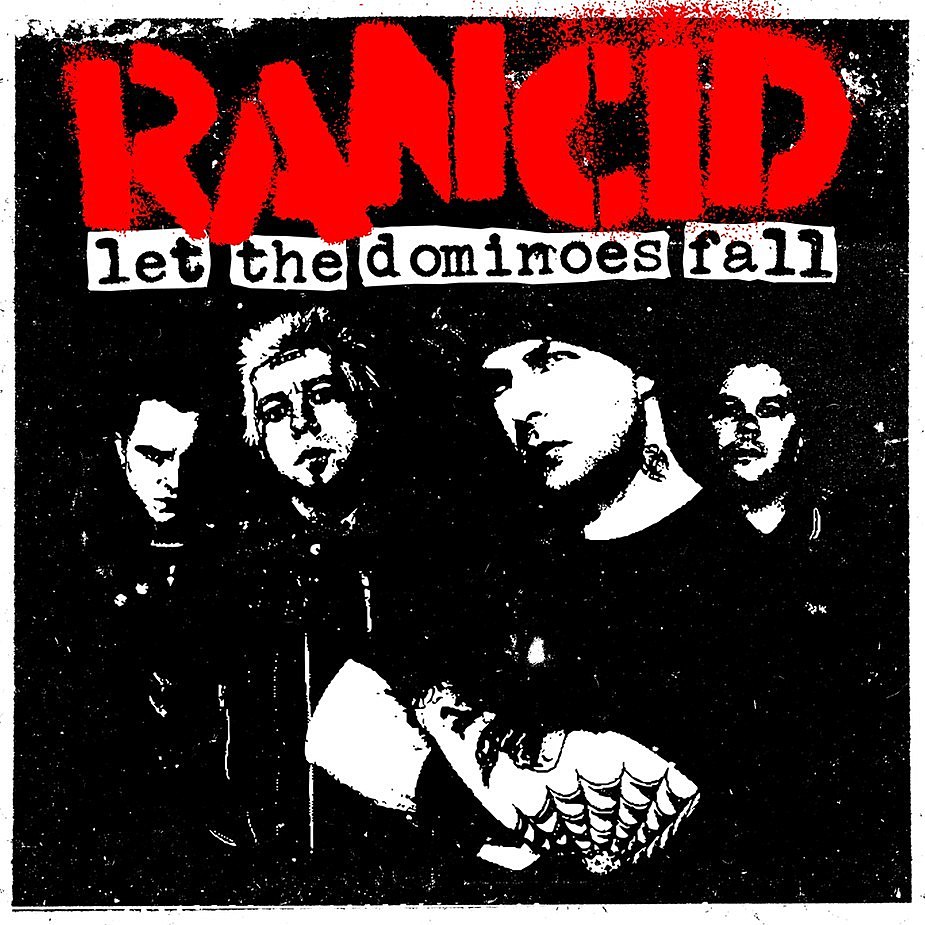
10. Let the Dominoes Fall (2009)
I wrote in the intro above that Rancid don’t have any bad albums and even their worst is pretty good, and Let the Dominoes Fall is indeed pretty good. But if I had to pinpoint the lowest point of Rancid’s career, this would be it. It’s understandable why this album suffered compared to their others; in many ways, the cards were stacked against it. In 2003, Rancid released Indestructible, which was the most popular album of their career and home to their biggest singles since their 1995 breakthrough …And Out Come the Wolves. The album was also met with some backlash and accusations of “selling out,” and it was followed by a hiatus and the departure of original drummer Brett Reed. (Brett was replaced by Branden Steineckert, formerly of The Used, who remains in Rancid to this day.) It’s not easy for any band to follow a hugely successful yet divisive album, a hiatus, and a major lineup change with a great new album, and those hurdles had to have had a negative effect. Let the Dominoes Fall does sound overall like classic ’90s Rancid, but the band just sounds less inspired than usual on it. It’s the Rancid aesthetic without the Rancid energy. It’s still worthy for a few listens, and you’d never bat an eye if a Let the Dominoes Fall song came on shuffle or the band played it live, but Rancid have otherwise done this kind of thing much better on many other occasions. It’s not easy to rank the albums of a band as consistently solid as Rancid, but Let the Dominoes Fall takes the lowest slot without much competition.

9. …Honor Is All We Know (2014)
Five years after Let the Dominoes Fall, Rancid returned with …Honor Is All We Know, and I don’t know what happened during those five years, but they came roaring back on this one. They spent more time than originally planned on the album, and they did plenty of touring during the process, so maybe Branden Steineckert was more settled into his role than on the previous album. It’s also the shortest album in the band’s career, and punk bands are always best when they don’t overstay their welcome. And it was hard not to see at least a few similarities to the band’s classic …And Out Come the Wolves. Is it really a coincidence that both album titles start with ellipses, or did Rancid do it as a way of presenting this one as a return to form? I’m tempted to believe it’s the latter, and it was a return to form. The title track is among the catchiest singles in Rancid’s discography, and it’s very much in the vein of the fist-raising singalongs of …And Out Come the Wolves. And in general, the album was a clear return to the sound of Rancid’s mid’90s period. It was produced by Bad Religion guitarist and Epitaph Records owner Brett Gurewitz, who also did 1994’s Let’s Go and every Rancid album since 2000, and Brett’s production style on …Honor Is All We Know was way more similar to Let’s Go than to any other previous 2000s Rancid album. It has that crisp, clear, unfussy sound that Let’s Go has, which is a much better fit for Rancid than the shiny Indestructible or the flimsier sounding Let the Dominoes Fall. And it was on …Honor Is All We Know that Rancid began taking a similar career path to their forebears in Bad Religion. As Bad Religion did during their early 2000s comeback era, Rancid seemed to decide that the best way for them to age gracefully was by sticking to the tried-and-true sounds of their classic albums, and writing songs that managed to hit just as hard as the classics. There’s nothing that Rancid do on …Honor Is All We Know that they hadn’t already done on Let’s Go or …And Out Come the Wolves, but they did it really, really well on this one. It’s the kind of album where longtime fans could instantly revel in the familiarity and newcomers could instantly get a taste of what Rancid do best.
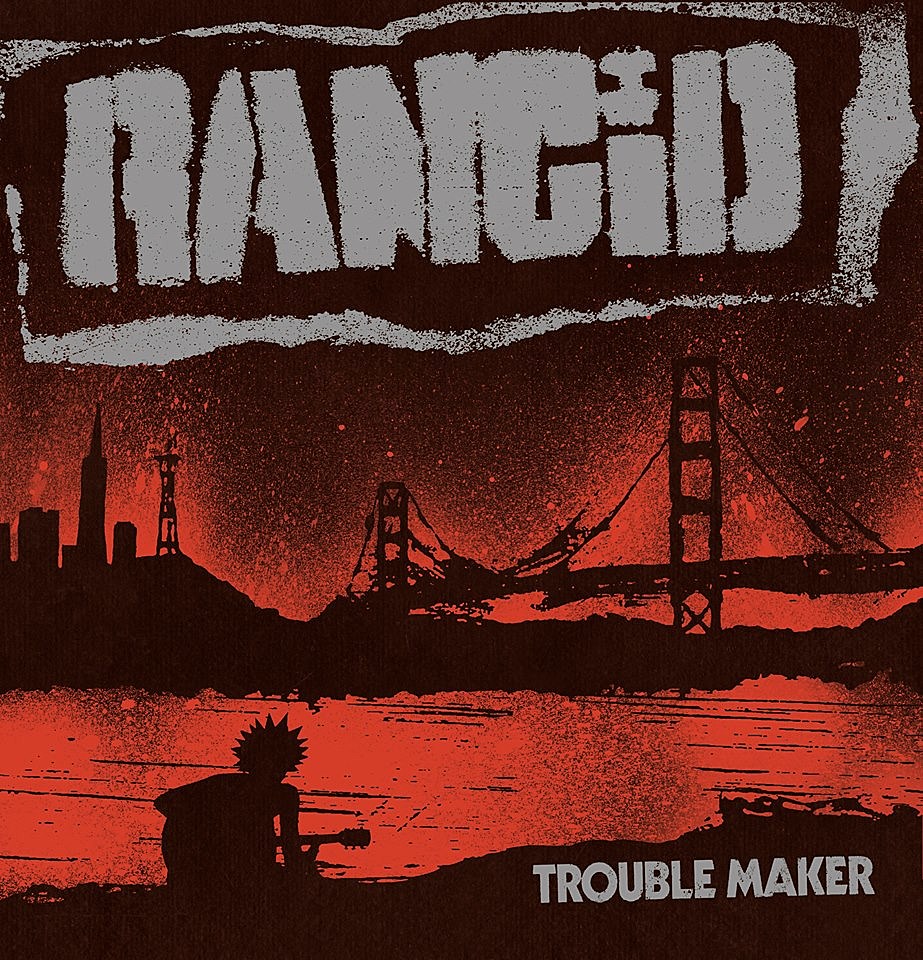
8. Trouble Maker (2017)
Rancid kept the ’90s revival going on …Honor Is All We Know‘s 2017 followup Trouble Maker — which brought back the logo from their 1993 album cover — and this time they did it even better. Trouble Maker is the fastest, hardest, and most straight-up punk album that Rancid put out since their 2000 album, and that’s a very exciting thing. A lot of punk bands mellow out over the years, but it’s way less often that you hear a punk band get back to this kind of no-frills adrenaline rush over 25 years into their career. 2014’s …Honor Is All We Know is the album where Rancid decided to go back to their roots, but Trouble Maker further refined the approach and saw Rancid hitting harder than they’d hit in years. Just about any song on this album holds its own next to the classics, and a decade earlier, you might not have ever expected Rancid would be doing that again. Tim and Lars’ voices sound as raw and pissed-off as they did back in the day, and the album is loaded with body-flailing rhythms, anthemic guitar leads, and of course tons of ultra-busy basslines that sound like they all could’ve come out two decades earlier. Trouble Maker is the best album Rancid had done in a very long time, and if and when they make a followup, here’s to hoping they continue down this path.

7. Tomorrow Never Comes (2023)
Update from 2023: Rancid did indeed continue down this path! Tomorrow Never Comes picks right up where Trouble Maker left off, the latest in a series of no-frills punk records that stick to a distinct, time-tested sound and feel newly fresh each time. Tomorrow Never Comes is classic street punk Rancid from start to finish, with songs that could be added to records like Let’s Go and …And Out Come the Wolves without anyone batting an eye. There’s nothing unpredictable on here, but there’s also no other band around that does what Rancid does better than they do. It’s their all-around hardest record since Rancid 2000, and it’s got some of the best hooks of their “later period” albums. 30 years on from their debut LP, and in a youth-oriented genre like this one, no small feat.

6. Rancid (1993)
It’s no surprise that Rancid came out swinging, considering Tim Armstrong and Matt Freeman had already cut their teeth as members of Operation Ivy, and Rancid were indeed a force to be reckoned with from the start. They put out their debut self-titled EP in 1992 on Lookout! (also home to Op Ivy), and then signed to their longtime home of Epitaph and put out their first full-length a year later. Both the EP and the album rip, and you can already hear the seeds of greatness being sewn, but Rancid is a humble release compared to what was to come. They were still a three-piece on this album, and the trademark Rancid sound would really be developed once Lars Frederiksen joined later that year, and they were still sticking mostly to their fast, no-frills, street punk influences on this one. Matt Freeman’s basslines are still out of this world, and Tim sings more than a few hooks that hint at the very catchy songs he’d go on to write, but this is mostly a more simplistic, straightforward Rancid than the one most people know and love. They hadn’t yet started experimenting with ska, reggae, rock n’ roll, slower tempos, organs, or the Clash influence they’d long be tied to. It’s just a fired-up punk album (with ridiculous basslines), and there’s nothing wrong with that at all. The only reason this album ranks on the lower side is that the band quickly went on to do much bigger and better things, but Rancid is a killer debut. Plenty of lesser bands start off with an album like this and never top it. Rancid topped it again and again.

5. Life Won’t Wait (1998)
After Rancid had their big mainstream breakthrough with 1995’s …And Out Come the Wolves, they wanted to go even bigger. Enter Life Won’t Wait, the lengthiest and most ambitious album that Rancid ever made. They brought some of Operation Ivy’s ska-punk back on …And Out Come the Wolves, but this time they embraced ska (and reggae) in more prominent and more traditional ways. They didn’t want to just be a punk band with upstrokes; they wanted to be the real deal. They recorded part of the album in Jamaica and got help from Jamaican reggae musician Buju Banton, as well as from members of veteran ska bands The Specials (Roddy Radiation, Lynval Golding, Neville Staple) and The Slackers (Vic Ruggiero, Dave Hillyard). They went beyond the standard punk setup to include organ, steel drums, sax, trombone, trumpet, blues harmonica, piano, and more. They wrote slower, cleaner, and longer songs, but they also wrote plenty of fast punk songs, and the list of guest punk musicians on the album is just as star-studded: Marky Ramone, Agnostic Front’s Roger Miret, Green Day’s Billie Joe Armstrong, The Mighty Mighty Bosstones’ Dicky Barrett, D Generation’s Howie Pyro. It’s like the album was one big shoutout to all the music they love, and sometimes the album was literally that. “Wrongful Suspicion” is an ode to New York punk and its lyrics shout out H2O, The Slackers, Stubborn All Stars, Sick Of It All, Agnostic Front, Crown of Thornz, D Generation, DJ Ansen, Dave Hillyard and the Rocksteady Seven, Simon and the Bar Sinisters, Nine Lives, Chrisipline and his new band Under The Gun, Madball, and Marky Ramone and the Intruders. On …And Out Come the Wolves, Rancid started getting pummeled with Clash comparisons, and with Life Won’t Wait, it’s like they tried to write their Sandinista! (and on “Lady Liberty,” they reference actual Sandinistas, which can’t be a coincidence).
For all the talk of Life Won’t Wait being Rancid’s big, cross-genre, reggae-meets-punk album, though, it’s not that different from …And Out Come the Wolves. If I had to criticize it, I’d say Rancid probably could have been even more ambitious and departed even more from their roots. The title track, which features Buju Banton and Vic Ruggiero and is one of the most overtly reggae songs on the album, is also one of the strongest and catchiest. Going further down this rabbithole could’ve resulted in an even more adventurous album. At the same time, the familiarity of the bulk of Life Won’t Wait helps the riskier songs go down easy. Absurdly catchy punk and ska-punk bangers like “Bloodclot,” “Warsaw,” “Leicester Square,” and “1998” could’ve fit just fine on …And Out Come the Wolves and they’re as strong as a lot of the songs on that near-perfect album. Mixing them in with the reggae of “Crane Fist” or the blues harmonica of “Cocktails” made for an album that struck a fine balance between the old and the new. It’s by far Rancid’s most unique album, and one of the most unique albums to come from a mainstream ’90s punk band in general.
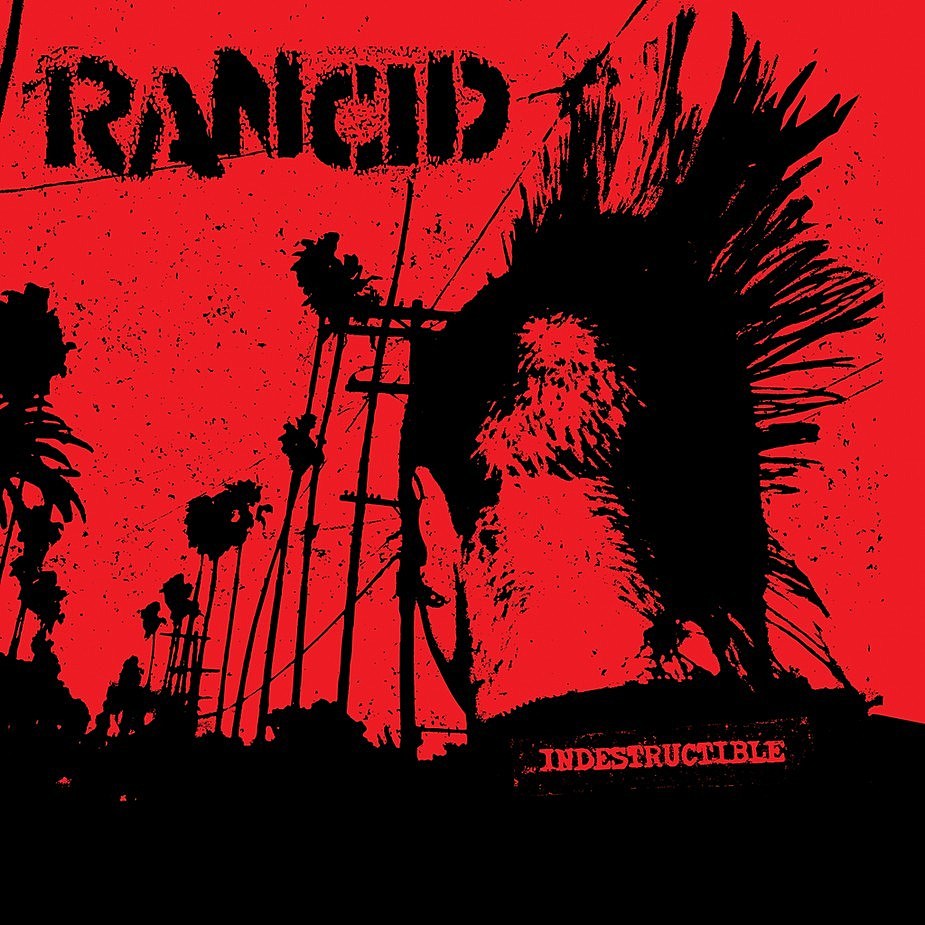
4. Indestructible (2003)
I might catch some flak for ranking “the sellout album” higher than the classic Life Won’t Wait, but the hate for Indestructible was always unfair and I think it’s been long enough that Indestructible can be fully recognized as the great album that it is. Fans were upset because Rancid signed a distribution deal with a major label, they blamed the more polished sound on Warner Bros, and nobody liked that the video for “Fall Back Down” starred members of Good Charlotte. I still don’t have a very good defense for Good Charlotte (who tried to look like Rancid but were never as punk as them), but they were only in the video. The songs are all still the Rancid you know and love, and it’s not like they brought in big pop producers to co-write the songs or anything. It was still produced by Bad Religion’s Brett Gurewitz, who produced most of their albums, and the production isn’t even that shiny. They obviously had a bigger budget than they did for the early records, so it’s a cleaner sounding record, but it doesn’t sound like… Good Charlotte or something. And besides, nobody over the age of 14 should be calling bands sellouts anyway. Haven’t Jawbreaker taught you anything???
If the cleaner production did anything for Rancid’s sound, it just brought out how there had always been strong pop songs stirring beneath Tim Armstrong’s gravelly voice. The …And Out Come the Wolves songs are the most classic, but Rancid have never written songs catchier than Indestructible singles “Fall Back Down” and “Red Hot Moon” before or since. And if you don’t think it’s punk to talk about strong pop songwriting, you must not listen to the Ramones or the Buzzcocks. Like a lot of musicians who emerged out of the punk underground, Tim Armstrong is a genuinely talented pop songwriter (he wrote and produced a hit for P!nk the same year Indestructible came out), and sometimes those punk musicians just need some better production to coax the great pop songs out of them. And, over 15 years later, “Fall Back Down” and “Red Hot Moon” hold up as two of the stronger pop-minded punk songs to come out of the whole mainstream punk boom. They retained the attitude and the style of classic Rancid, but they went down even easier than the classics and they held their own against the actual pop of the time. And plus, when you consider that those are the two poppiest songs that Rancid ever wrote, you’re still looking at a band who are way more abrasive than the large majority of mainstream pop punk bands. Indestructible can’t just be boiled down to those two songs though. Part of the reason that the album ranks so high is that, throughout its 19 tracks, it just keeps offering up ripper after ripper. There’s a slow song or two in the mix, but mostly Rancid just sound like a well-oiled punk and ska-punk machine on Indestructible. It’s definitely an album that favors economical, accessible songs over anything that borders on “risky,” but even with that being the case, it’s got a handful of fast, aggressive punk songs and even a straightup hardcore song (“Out of Control”), and there aren’t many mainstream sellout punk bands who write rippers like that.

3. Rancid (2000)
1998’s Life Won’t Wait was Rancid’s big, genre-defying, statement-making, and least punk-sounding album, but after that one came out it appeared they had another statement to make: that they could still be a punk band. A no-bullshit, hard-as-hell punk band. Their second self-titled album (following their 1993 debut) is the closest Rancid ever came to making a hardcore record, and it’s real-deal hardcore. It wasn’t a put-on at all; it was just proof that Rancid could’ve been a hardcore band this whole time if they wanted to. Following the more ambitious …And Out Come the Wolves and Life Won’t Wait, Rancid reunited with Bad Religion’s Brett Gurewitz (who also produced the more traditionally punk 1994 album Let’s Go), and Rancid 2000 was very much a return to the band’s more traditional punk roots. But even Rancid’s earliest work wasn’t as whiplash-inducing or as gut-busting as this. (Rancid have often had intimidating-looking artwork, but the black, skull-and-cross-bones art of Rancid 2000 was yet another indicator that this was a meaner Rancid than we’d ever seen before.) Matt Freeman took lead vocal turns for the first time since Let’s Go, and his rasp is perfect for a more aggressive punk record, though it’s often Lars Frederiksen’s songs that are the most overtly hardcore. His bark on songs like “I Am Forever” and “Loki” are as punishing as anything that came out on SST or Dischord or Revelation in the ’80s. And the album’s razor-sharp, full-throttle power chords rival the great bands of that era too. Most of the songs are under two minutes and some are even under one minute. There’s no ska, reggae, organs, production tricks, or anything fancy going on: just balls-to-the-walls punk rock with all the anger, attitude, and precision in the world.
Lars is the album’s secret weapon, with his born-too-late bark that would’ve shaken up the world of hardcore two decades earlier, but as is usually the case with Rancid, it’s those sneaky Tim Armstrong hooks that keep the album a step above the countless ’80s hardcore worshippers that still exist today. Rancid making an ’80s hardcore record in 2000 is like Kendrick making a ’90s rap record with 2017’s DAMN.; they took a stripped-down sound from the past that paved the way for their more complex music, and they did it in a way that did justice to their heroes’ music and was still accessible to their younger fans. The hooks on songs like “Rwanda” and “Antennas” are among the catchiest in Rancid’s discography; they’re just worked into short, fast, no-frills songs instead of poppy, mid-tempo, radio-friendly punk songs. (Not to mention, “Antennas” remains an incisive criticism of Hollywood stopping at nothing — not even sexism or racism — to make a buck.) While Life Won’t Wait sounded like an attempt at a classic, Rancid 2000 just sounded like Rancid having fun and playing some music they love, but they ended up writing a handful of classic songs in the process. When you compare it to the trademark sound and the out-of-this-world punk songwriting of the next two albums on this list, you sort of can’t call Rancid 2000 their best album. But it is the coolest and most unlikely album they ever made, and I come back to it just about as often as I return to their most definitive LPs.
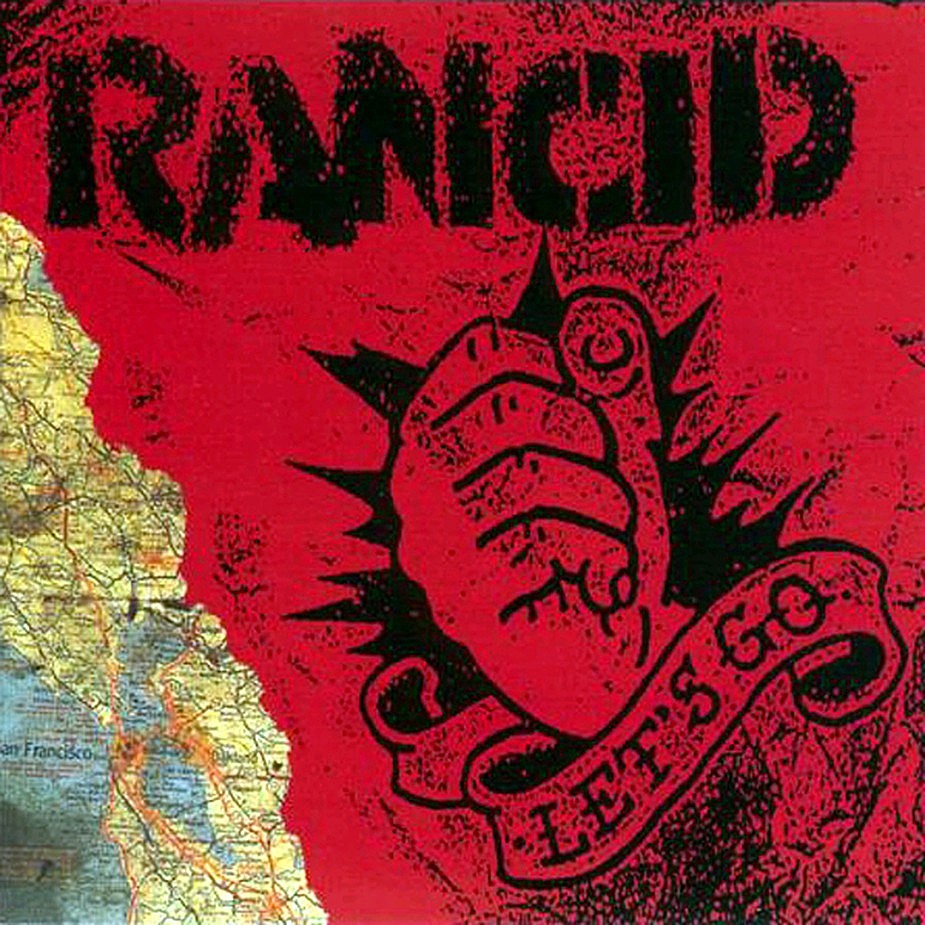
2. Let’s Go (1994)
Rancid’s 1993 album was a solid yet humble debut, and the band’s only album recorded as a trio. But once they solidified the classic lineup of original trio Tim Armstrong, Matt Freeman, Brett Reed, and then-new guitarist/vocalist Lars Frederiksen, and teamed up with producer Brett Gurewitz of Bad Religion (who would go on to produce most of their albums), Rancid made their proper introduction on 1994’s Let’s Go, and it remains home to some of the very best songs of their career. The seeds for Let’s Go were being sewn on the debut, but it’s still hard to believe they made such a giant leap in just one year. It almost sounds like a different band. (And technically, it sort of was.) Let’s Go wasn’t yet embracing the ska that …And Out Come the Wolves would embrace, but it saw them branching out pretty far from their straightforward debut, with cleaner guitars, slower tempos, more dynamics, and more complex rhythms. And most importantly, they were all of a sudden writing really, really great songs. The debut album showed that Tim Armstrong knew his way around a hook and that Matt Freeman was a beast on the bass, but here Tim (and Matt) are writing timeless choruses and Matt’s basslines are nearly as memorable as some of the words. And Let’s Go is just an onslaught of great songs. It’s not fair to call it top heavy, but Rancid were smart enough to put the best songs up front, and what a hell of a way to start a record. The first five songs is one of the greatest chunks of music to come out of the entire ’90s punk era. Each song throws you right into the action; there’s maybe a snare hit or about five seconds of power chords and lead bass, and then you’re just hurled straight into the hook. Let’s Go isn’t as simplistic as either of the self-titled albums, but it doesn’t waste time with things like intros or outros or interludes or anything like that. It’s basically the ideal punk album: nothing but loud, in-your-face songs that you’ll be yelling along to by the second listen, and a strong identity that separates it from the masses of punk bands trying to do exactly the same thing.
Let’s Go wasn’t a mainstream breakthrough like its followup, but it did start to gain Rancid fans outside of the punk scene, it just cracked the top 100 on the Billboard charts, and it’s since been certified Gold, making it the only Rancid album besides …And Out Come the Wolves (which went platinum) to get a certification. Let’s Go was the beginning of Rancid making their mark in the mainstream world, but you would never call it “pop punk.” It’s not as hard as Rancid 2000, but Let’s Go matches its many, many hooks with just as much attitude and aggression. It’s as pissed-off as ’80s hardcore and as hook-oriented as ’70s punk. It was the perfect way to bring punk into the ’90s, not by “reviving” something that had been done already but by absorbing everything that had been done already and spitting it back out with your own twist. Cynics of mainstream ’90s punk jumped at the chance to point out other bands had done this kind of music already, but now with 25 years of hindsight, it feels safe to say there really weren’t any other bands who sounded like Let’s Go. Rancid’s debut album was tight, but it didn’t establish an identity. On Let’s Go, the Rancid that has existed for the past quarter-century was born.

1. …And Out Come the Wolves (1995)
There are days when I’m convinced that the nearly-perfect Let’s Go is the best Rancid album. It’s certainly their best straight-up punk, it kicks your ass harder than the band’s more popular albums, and none of its songs are outplayed. But then I hit play on …And Out Come the Wolves, and I remember that this even more perfect album will always top the list. It’s probably the most popular choice for best Rancid album, and with good reason. Everything you want from Rancid is on this album, it never drags, there are never any low points. It’s got their most-loved hits, and about half of the other songs feel like hits. It’s the perfect balance between the ambition of Life Won’t Wait, the pop appeal of Indestructible, and the punk aggression of Let’s Go. As memorable as the Let’s Go songs are, these songs are tenfold. These are songs that are forever loved within the punk community, and your casual alternative rock fan can sing along to them too. On …And Out Come the Wolves, Rancid infiltrated the mainstream without sacrificing any of their integrity or their values, and the songs sound as fresh today as they did in 1995. Let’s Go is nearly impossible to part with, but if I had to pick only one Rancid album to have for the rest of my life, I’ll always pick …And Out Come the Wolves.
I don’t think that Rancid set out to write a hit-making, Platinum-certified album when they wrote …And Out Come the Wolves, but the band and Epitaph Records at least knew a hit was possible at this point. Let’s Go fared modestly well in the mainstream, but that same year Rancid’s Epitaph labelmates The Offspring became stars with Smash and their old pals Green Day did the same with Dookie. After recording Let’s Go with Bad Religion’s Brett Gurewitz producing, they enlisted in the help of Jerry Finn, who had mixed Dookie, to produce …And Out Come the Wolves. Just a few years later, Jerry Finn would go on to turn bands like blink-182, AFI, and Alkaline Trio from punk bands to pop stars, but on …And Out Come the Wolves, Finn hadn’t yet become punk’s go-to pop producer and the album still has the raw, gritty edge of Rancid’s previous releases. Still, …And Out Come the Wolves is their mainstream breakthrough release, it scored them hits with “Ruby Soho,” “Time Bomb,” and “Roots Radicals,” and it helped land them a performance on Saturday Night Live that same year.
But while Green Day’s songs were clearly pop and The Offspring’s biggest hits veered towards the sounds of the already-popular grunge movement, Rancid were still firmly in punk territory on …And Out Come the Wolves. They were also in ska territory, as this was the album where Rancid finally brought back the ska-punk sounds of Tim Armstrong and Matt Freeman’s band Operation Ivy, but while ska got a mainstream reputation for being a silly, lighthearted genre, Rancid’s ska songs were tough. Green Day and The Offspring’s biggest songs were tapping into feelings and anxieties that teenage middle class America (and, as was often the case, teenage middle class American boys) could easily relate to, but Rancid were tough, intimidating, Mohawk-having punks painting a picture of a gritty American underbelly that radio rock listeners were most likely not familiar with. Tim Armstrong and the rest of the guys emerged as great punk singers and songwriters on Let’s Go, but here they became great storytellers, and they told stories of junkies and crooks and gangs and living in the sewers and on the streets and all kinds of stuff that middle class America had probably never experienced firsthand. They were singing about that stuff on Let’s Go too, but on …And Out Come the Wolves their lyricism evolved from punk sloganeering to gripping storytelling. It makes sense that Tim Armstrong ended getting so involved with hip hop; he developed a clear-eyed, unfiltered style of lyricism that was often closer to rap than to most punk.
…And Out Come the Wolves brought out the best in Rancid in every way: the lyrics, the hooks, the basslines (the most iconic Rancid bassline is of course the solo on Wolves opener “Maxwell Murder”), the balance of punk and ska. Some of the best ska-punk songs ever written are on …And Out Come the Wolves; it’s songs like “Time Bomb” and “Old Friend” that defined the style Rancid would “go pop” with on Indestructible, and the style Tim would help revive with his now-popular protégés The Interrupters. They didn’t go full reggae on this album like they did on Life Won’t Wait, but they brought in some reggae organ and they certainly sang about reggae on this one. (Unlike Life Won’t Wait and unlike most ska, this album had no horns.) And if Rancid opened Let’s Go with a perfect five-song run, I’d say they opened this one with a perfect nine-song run. From “Maxwell Murder” through “Ruby Soho,” each new song starts and instantly gives you that feeling of “oh yeah, this one!” It’s the kind of album where you start to memorize the sequence, you can always feel what’s coming next, and you never want to hear it any other way. The album’s three singles all fall during that first nine, but all nine of them feel like they belong on a Rancid greatest hits album. And while Rancid albums tend to be long with the fan favorites up front, the 19 songs of …And Out Come the Wolves never drag and tons of fan favorites pop up during the second half, like “Journey to the End of the East Bay” and “Old Friend” and “As Wicked” and album closer “The Way I Feel.” No other Rancid album stays this strong all the way through. Even the songs that don’t stand out as much as the big fan faves remain memorable and essential. Part of that is because Rancid knew to give their songs just the right amount of musical diversity on this album. As great as Let’s Go is, the songs can sometimes start to blur but that never happens on …And Out Come the Wolves, where each individual song is its own beast. Rancid would go further down the musical diversity rabbithole on the ambitious Life Won’t Wait, but on this album they’ve got the perfect mix of branching out from your roots and saying true to them. Life Won’t Wait sounds like it was written to top …And Out Come the Wolves and become considered the band’s definitive record, but sometimes you just can’t control that kind of thing. If Life Won’t Wait is their Sandinista! then …And Out Come the Wolves is their London Calling. It’s forever the band’s most iconic work, and it deserves to be.
—
Pick up Rancid records and merch in our store.






